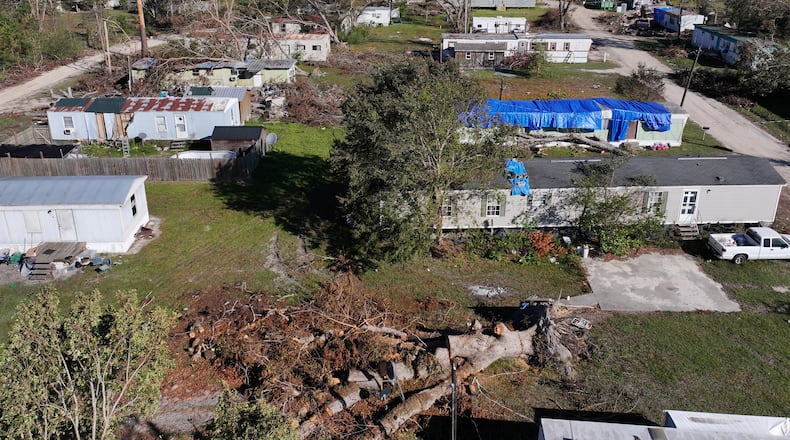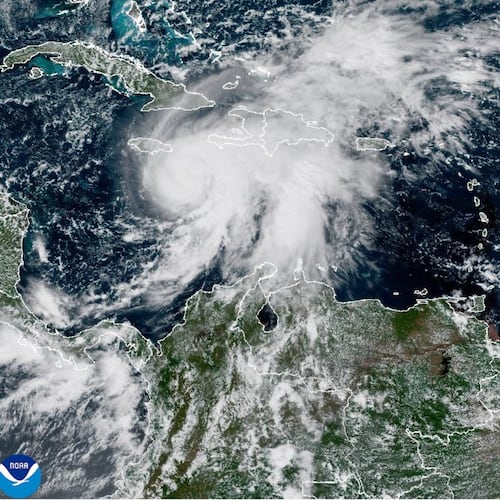With more than a month left in what has already been one of the most destructive hurricane seasons in Georgia history, a new Atlanta Journal-Constitution poll finds more than two-thirds of the state’s likely voters believe climate change played at least some role in worsening the storms’ impacts.
Georgia has been hit by multiple hurricanes this season, but by far the most destructive storm was Hurricane Helene. After making landfall in Florida’s Big Bend region last month as a Category 4 hurricane, the storm pushed into Georgia, knocking out power to more than 1.7 million people and devastating crops across a wide swath of the state.
Scientists have said human-caused climate change likely played a role in allowing the storm to rapidly increase in intensity as it approached land, plus dump record amounts of rain in Georgia, the Carolinas and Tennessee. Helene killed at least 33 people in Georgia, officials have said, and more than 200 across the Southeast.
Nearly a quarter of the poll’s respondents, 23%, said they believed climate change was “entirely” responsible for increasing the severity of recent hurricanes. About 19% said the shifting climate was “mostly” to blame, and another 26% said it was “somewhat” responsible.
About a quarter of those polled said climate change had no effect at all, and about 7% said they “don’t know.”
The poll, the last AJC survey before the Nov. 5 election, involved 1,000 likely Georgia voters and was conducted Oct. 7-16 by the University of Georgia’s School of Public and International Affairs. The margin of error was plus or minus 3.1%
The polling began less than two weeks after Hurricane Helene struck Georgia and just as Hurricane Milton was bearing down on Florida’s west coast. Back in August, Hurricane Debby also caused severe flooding in parts of coastal Georgia.
Poll respondents who identified as Republican were more likely to downplay the role of climate change, with almost 43% saying it played no role at all in worsening the storms. Only 4% of Democrats and 23% of independents surveyed shared those views.
Augusta resident Peggy Lovelace, 88, was among the conservatives surveyed who think climate change is increasing the destructive potential of storms
Augusta and its suburbs were among the hardest-hit parts of the state by Hurricane Helene. Though her home was spared major damage, Lovelace said the wreckage Helene caused in the city is still evident weeks later. For someone who has spent almost her entire life in the area, she said the storm was unlike anything she’d ever seen before.
Her grievances about climate change have less to do with the problem itself and more to do with the potential solutions. In particular, she disagrees with policies that “make people buy electric cars.”
President Joe Biden’s administration has not proposed banning gas-powered cars, but earlier this year, the administration unveiled a rule aimed at reducing tailpipe emissions of greenhouse gases, a major cause of climate change. The rule will require automakers to offer mainly all-electric or hybrid models in the U.S. by 2032.
“Some people are going to naturally go to electric cars,” said Lovelace, who plans to vote for former President Trump in the election. “I don’t think you should have laws that say by such and such year you probably can’t have a gas car.”
Younger Georgia voters appear much more open to accepting that climate change is influencing hurricanes. More than 54% of poll respondents between the ages of 18-29 said climate change was entirely behind the more intense storms, compared to about 18% of likely voters between 30-44 and 16% aged 45-64. More than one-fifth of respondents 65 or older thought the changing climate was completely responsible.
Credit: Arvin Temkar/AJC
Credit: Arvin Temkar/AJC
Drew Schweitzer, a 31-year-old senior operations analyst who lives in Grovetown — 20 minutes west of Augusta — was among those polled who said he feels the effects of global warming in his daily life.
Schweitzer, who describes himself as a leftist and plans to “begrudgingly” cast his vote for Vice President Kamala Harris in the upcoming presidential election, said he and his wife evacuated to Charlotte for about a week after Hurricane Helene struck.
He said the storm ripped off some shingles and damaged a fence, but that his home was otherwise spared. His parents’ home in Augusta was less fortunate — a pair of large pecan trees were blown over, crushing a shed and the back of their house, he said.
Beyond the storms, Schweitzer said he notices how much hotter it has gotten since he was a child.
“I might not have a college degree, but I’m not dense,” he said. “Of course, man-made climate change is absolutely real, it’s devastating, and I think we consistently feel its impact.”
The poll also probed voters’ views on the response to Hurricane Helene, which has bled into the presidential race.
Overall, the state of Georgia got higher marks than the federal government on its efforts from likely voters.
More than 71% of respondents said Georgia officials had done either an “excellent” or “good” job in the aftermath of the storm, compared to just 37% who held the same sentiments about the federal government’s response.
The poll also revealed a strong correlation between views on President Biden’s administration’s relief efforts and respondents’ political ideology.
Only 2% of respondents who identified as conservatives felt the federal government’s response had been excellent, compared to about 34% of liberals. More than 59% of conservatives said the federal relief has been poor, compared to just under 10% of liberals and 22% of moderates.
Former President Donald Trump and several of his allies have spread a laundry list of false claims about the federal government’s response to Hurricanes Helene and Milton.
So far, Biden has approved nearly $2 billion in hurricane recovery assistance across all states impacted by Helene. Biden has also approved disaster declarations for dozens of south and east Georgia counties, stretching from near the Florida border up to the Augusta area.
Georgia’s state and federal leaders have called on Congress to pass a new hurricane relief package, but both chambers are in recess and have not heeded calls to return to Washington early to consider fresh aid.
A note of disclosure
This coverage is supported by a partnership with Green South Foundation and Journalism Funding Partners. You can learn more and support our climate reporting by donating at ajc.com/donate/climate.
About the Author
Keep Reading
The Latest
Featured



